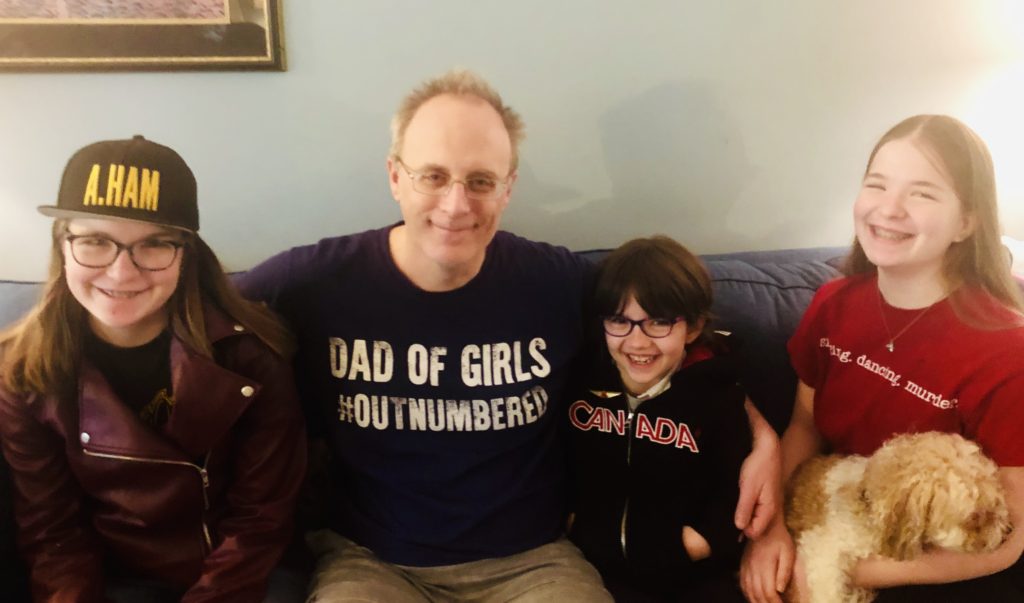I know it’s Mother’s Day but I wanted to share this picture of my kids and their father because he does so much of what we see often think of as “mothering” – the care and feeding of others. In his case, it’s the lion’s share of the childcare, as it evolved from infant and toddler care to adolescent care and (the hardest) teenage care, all of the cooking and the laundry and most of the errands. I know he is not the only one.
Women struggle with working motherhood and the “second shift” (using the phrase from Arlie Hochschild’s book, still relevant 30 years later – women still do 60% more unpaid work, at least) because of this expectation that the woman in a heterosexual couple is to do all these things, even if she works. Plus, there is the assumption that if there is to be one significant income, it is the dad who brings it in. This underpins Ross Douthat’s struggle in the New York Times just this week to moderate a cultural and economic argument. It is, he says, between those who think that “dual-earner culture reflects understandable female ambition” and those who think that this culture hurts “families that want to raise kids on one income, or one income and some part-time work, and instead find themselves pressured, financially and culturally, to keep up with the dual-earning Smith-Joneses next door.”
He follows that observation by talking about the many women who want to work less or more flexibly and have more children – obviously, the one-income he is referring is the father’s. He goes with this argument: “No matter how gender-egalitarian society becomes, the physical realities of gestation and childbirth make it natural for most families to desire at least a temporary division of labor during the years when their kids are young, a temporary period of male breadwinning to balance the burden borne by mothers.”
Gestation and childbirth, and nursing to boot, are certainly physical realities – I certainly remember them – but after a few months, does the burden still have to “borne by mothers”? Does it have to for years, as he says? If it does, then of course some women (emphasis on some) want to do less paid work. (And maybe not hyphenate their name, if Douthat – who I am guessing never had to seriously face even the choice of changing the name he grew up with – is poking fun at the “Smith-Joneses.”)
In Claire Cain Miller’s recent excellent article about the huge pay gap between highly educated women and their partners, she explains that one significant reason for the disparity is the demands of the jobs these women have trained for, such as big firm law. That is not compatible with a definition of “mother” that includes a significant domestic burden.
Douthat’s reflexive thinking of where this burden naturally falls is paradigmatic, and while this bias is not waving to us the way it did in the Donna Reed 1950s, it is still sitting there underneath so much of how we talk about parenting. A mother’s responsibilities comprise countless memes on social media. Sometimes I think maybe the first step is to complain about what “being a mom” entails (often the consumption of wine in a locked bathroom). I was happy to see that our previous Manhattan public school had a few “class dads” at various times. I have not seen them yet in our current home in suburbia, though.
Family friendly policies and generous maternity and paternity leave are very long overdue in this country, along with universal child care, and while they would go a long way to helping change the dynamic, they may not be a silver bullet when it comes to changing norms. As Cain Miller also points out, European countries are much friendlier to parents, and women are more likely to work than in the U.S., but they are actually even less likely to reach senior levels.
Today the Times ran an extensive article on how female House members with young kids “do it” (basically how they “mother” their kids while in office), a piece the Times would never, of course, run or think about regarding fathers. Because these deep assumptions about motherhood that have affected me as well, it was a piece that caught my own eye. I have written some similar ones myself as I grappled with my role in our family and in society and detailed how I “did it.”
We don’t usually ask how Beto O’ Rourke “fathered” his three young kids when he went on a soul-searching trip – or at least we wouldn’t see that question get asked before now. He gets a glitzy Vanity Fair cover — not a “how he does it” piece. But, that did not go completely unnoticed. He even had to walk back some of his comments about childcare. In our family, where my husband has shown us every day for 14 years that the father can be the “mother,” that kind of trip by the father would leave us struggling for childcare and rides, not to mention the laundry and takeout bills that would pile up.
So, today, I want to wish everyone who “mothers” someone else – or many people of different ages – a happy Mother’s Day.


Great article, Rebecca!
Thank you!